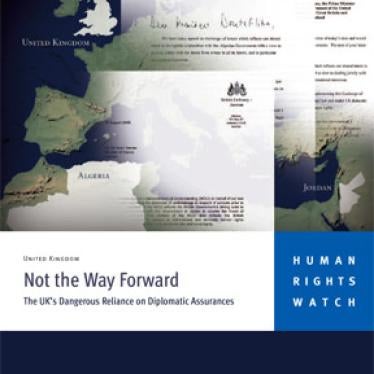(London, October 22, 2008) - The British government should immediately halt plans to deport foreign terrorism suspects to countries that offer unreliable promises not to torture them, Human Rights Watch said in a report released today.
The 36-page report, titled "Not the Way Forward: The UK's Dangerous Reliance on Diplomatic Assurances," focuses on two important appeals in the House of Lords this month that will test the reliability of no-torture promises from the governments of Algeria and Jordan.
"There is plenty of evidence that these governments cannot be trusted to prevent torture," said Julia Hall, senior counterterrorism counsel at Human Rights Watch. "That's why there's a ban on sending people back to places where they risk such abuse. If these men are suspected of terrorist activity, prosecute them in fair trials in the UK."
In the pending appeals, Britain's highest court will grapple for the first time with the government's "deportation with assurances" policy, an important component of its counterterrorism strategy. In RB and U v. Secretary of State for the Home Department, to be heard on October 22 and 23, 2008, the potential deportees are two Algerians. Assurances from the Algerian authorities that the person would not be tortured if returned to Algeria were negotiated in each case.
On October 28 and 29, the Lords will hear Secretary of State for the Home Department v. OO involving Omar Othman (a.k.a. Abu Qatada), a radical Muslim cleric accused of ties to al Qaeda. The UK is seeking to deport Othman on the basis of assurances against torture from the Jordanian authorities in a diplomatic "memorandum of understanding." Human Rights Watch and Justice, the London-based affiliate of the International Commission of Jurists, submitted a third-party intervention for consideration in both appeals.
In all three cases, the British government concedes that, but for the assurances, the men would be at risk of torture; it is thus the effectiveness of the assurances that lies at the heart of the appeals.
"The torture and abuse of terrorism suspects in Algeria and Jordan is no secret, yet both governments routinely deny credible allegations of such abuse," said Hall. "The British government has no control once a person is deported. The only way to eliminate the risk these men face is to halt their deportations."
If returned, the Algerians will most likely be detained by the notorious Department for Information and Security (DRS), whose operatives have been accused of - but never held accountable for - abuses such as beatings, electric shock torture, suspending prisoners from the ceiling, and forcing them to ingest chemicals.
In its May 2008 review of Algeria, the United Nations Committee Against Torture expressed serious concern about reports of secret detention centers operated by the DRS, numerous cases of torture and ill-treatment reportedly at the hands of the DRS, and the lack of prompt and impartial investigations into allegations of such abuse.
Othman would probably be handed over to Jordan's General Intelligence Department (GID), which has been accused of similar types of abuse. In 2006, Human Rights Watch documented cases of torture by the GID in a report titled "Suspicious Sweeps: The General Intelligence Department and Jordan's Rule of Law Problem".
In an April 2008 report, "Double Jeopardy: CIA Renditions to Jordan", Human Rights Watch documented how the GID served as a proxy jailer and abusive interrogator for the Central Intelligence Agency (CIA) from 2001 until at least 2004. Human Rights Watch also submitted an expert affidavit in earlier proceedings in the Othman case arguing that the assurances contained in the UK-Jordan "memorandum of understanding" were not an effective safeguard against torture.
The "Not the Way Forward" report also documents the United Kingdom's attempts to advocate at the European Union for broad acceptance of diplomatic assurances; reviews recent European Court of Human Rights jurisprudence in cases involving diplomatic assurances; and explains how other countries - including Denmark, Italy, Kyrgyzstan, Russia, Spain, Switzerland, and Turkmenistan - are exploring or already using diplomatic assurances for deportations and extraditions, further weakening the global ban on transfers to places where there is a risk of torture.
"The British government is setting a bad example at a time when torture prevention is under assault," said Hall. "It should be holding perpetrators of torture accountable, not partnering with them."







